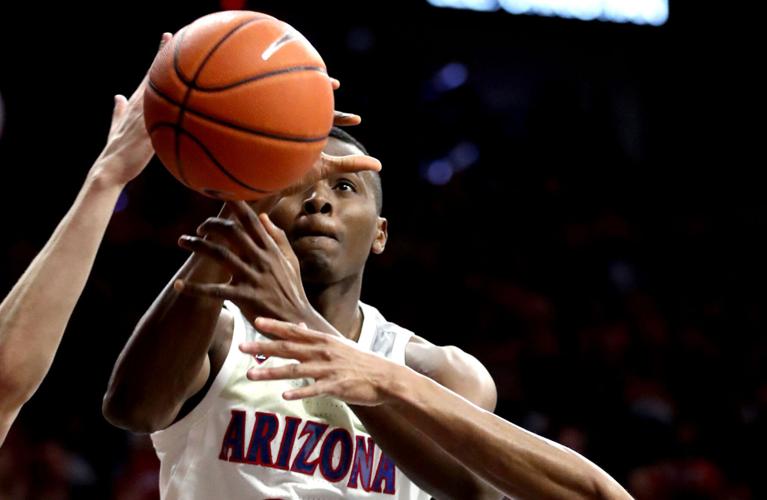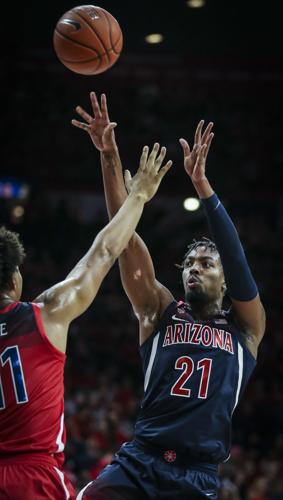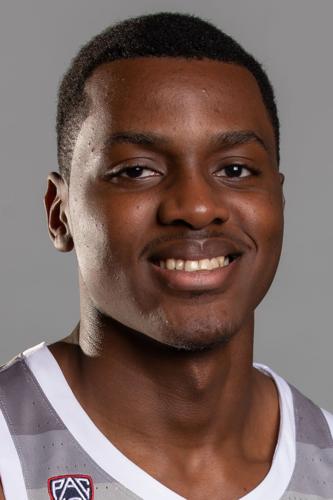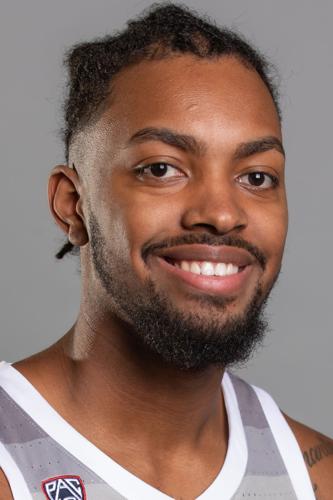Preseason buzz over Arizona’s perimeter was inevitable.
After all, the Wildcats added five new guards, including a former Big East freshman of the year (James Akinjo), an all-Western Athletic Conference pick (Terrell Brown) and the summertime hero of Estonia’s national team (Kerr Kriisa).
But so far the truth is this: The gold jerseys UA coach Sean Miller gives his best practice players on a weekly basis have only gone to post players Jordan Brown and Christian Koloko, while all the bigs have credibility. Not only are Arizona’s two most experienced returnees in the post — Koloko and Ira Lee — but Brown just happens to be the Wildcats’ only McDonalds All-American alum.
And of their other bigs, Lithuanian Azuolas Tubelis prompted ESPN to call him the best European prospect to choose the U.S. college route this season while French forward Daniel Batcho also showed promise before a knee cartilage issue sidelined him last month.
If nothing else, that combination of skills and experience is making practice interesting in the same way as the Wildcats did inside last season, when Zeke Nnaji and Stone Gettings brought widely differing skillsets to practices and games.
“It’s very similar, actually,” Brown said. “You’ve got people like Azuolas, who can really handle it on the perimeter and drive the ball. You’ve got people like Ira Lee, who’s really athletic and has a drive and is going to go at you every possession.
“Then you’ve got people like Christian Koloko, who is a great shot-blocker, great finisher around the rim. It’s really good to be going against these guys.”
During the Wildcats’ second day of virtual preseason interviews Friday, Koloko agreed.
“Myself, Jordan, Azuolas and Ira, we all bring different things to the game so I think it’s probably pretty interesting to see how we all play together,” Koloko said. “I realize you guys all know what Ira’s capable of doing and I think you will be surprised about Azuolas — he’s left-handed and sometimes I hate guarding left-handed players. He’s got really good touch around the rim, and his mid-range jumper is pretty good.”
It’s just that Tubelis won’t exactly say those kinds of things about himself: While he’s fluent in English, he appeared soft-spoken during his interview session on Thursday, and apparently his approach is the same on the court.
“That’s my silent killer,” Lee said. “He doesn’t say much but he comes in every day, he does his job. He works hard and he might be one of the best left handed players I’ve ever played with.”
While Tubelis has been expected to compete for a starting or major contributing role right away this season, Brown and Koloko are certain to do so. Koloko averaged 8.3 minutes last season, providing a defensive spark around the rim, and taking advantage of time behind the scenes to improve.
“I wasn’t playing a lot so just for me to have extra reps in the weight room with coach (Chris) Rounds, get extra reps on the court, working on my game, on my hook shot, that was really exciting,” Koloko said.
“By the end of the year I was playing a little bit more so, it was just showing me that hard work pays off.”
Hard work, and hard faith in himself, that is. While Koloko became something of a fan favorite for his energy and shot-blocking over those average 8.3 minutes, that’s still almost 32 minutes a game sitting on the bench.
“It was really about trusting myself because when I wasn’t playing a lot sometimes I was doubting myself like, ‘Why am I not playing a lot?’ ” Koloko said. “I talked with my coaches and they just told me to keep working. I kept working hard and everyday came to practice ready. And this year is going to be a different year — I’m going to have a different role and I think I’m ready.”
As a redshirt, Brown’s situation was different last season: He knew he wouldn’t be playing, so poured all of his energy into practices and learning, while gaining 25 pounds (up to 235) on his 6-foot-11-inch frame.
But Brown also knows Koloko’s frustration: A year earlier, he played a limited role on a veteran Nevada team, averaging just 3.0 points and 2.1 rebounds over 10.1 minutes.
Those past two years of wildly different experiences have changed him, Brown said.
“I feel like I have a better feel for the system after being in college for three years,” Brown said. “I have a better feel for the game, like I’ve grown as a player. And I have more overall confidence in what I can do.”
While UA practices are closed, evidence suggests the competition between Brown and Koloko has been especially interesting: Brown earned the gold jersey for the first two full weeks of practice, and then Koloko ripped it away this week.
“He’s just working man,” Brown said. “He’s working. Everybody’s working hard in the practices and it gets tough. Everybody’s going to be after that gold jersey. I’m gonna be back after it, too.”









